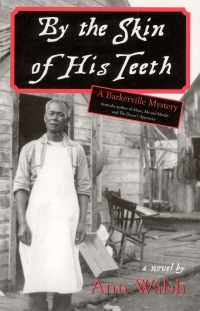| ________________
CM . . .
. Volume XI Number 21 . . . .June 24, 2005
excerpt:
By the Skin of His Teeth is the third volume involving Ted MacIntosh whose story began in Moses, Me, and Murder and was continued in The Doctor's Apprentice. It's November 3, 1870, some two years since readers last encountered Ted who, now 16, is working in his father's carpentry shop in Barkerville, a gold rush town in the then colony of British Columbia. The book's overriding theme is prejudice which manifests itself in two forms, the principal one being racial and the secondary, gender. While walking near Barkerville's Chinatown, Ted hears cries of "Murder," and, upon investigating, he comes across the victim, Ah Mow, a restaurant owner who has been killed by a knife wound, the murder weapon allegedly wielded by a white man, Henri Tremblay. Tremblay, a well-known and influential person in the Cariboo area, owns a farm and a store in neighboring communities and is also a dealer in agricultural products. His attitude to Ah Mow's death, an attitude shared by many whites, is: "It was only a Chinaman, a Celestial. What matters the death of one of them?" Following a coroner's jury, Tremblay is nonetheless charged with murder, but his trial cannot occur until many months later when the Supreme Court circuit judge arrives. During the intervening period, Tremblay, unlike three Chinese men accused of other crimes, is released on bail, and he uses his freedom and power to intimidate the only witnesses, all Chinese, so that when the trial finally occurs in July 1871, all those who could testify against him have either fled or they change their testimony. However, according to the presiding judge, Tremblay escaped incarceration "by the skin of his teeth." Walsh introduces a new character, Jenny, the feisty niece of a character from The Doctor's Apprentice. Jenny, about 14, has just arrived from Scotland to be a nursemaid to two Barkerville children. Not only does she eventually become Ted's romantic interest, but she provides the focus for the historical period's gender-based prejudice. When Jenny learns that females are not allowed to participate in the races conducted during Dominion Day festivities ("No respectable woman would want to do such an unladylike thing as race in public."), she comes up with a ruse so that she can have Ted as her partner in the three-legged race. Her plan is to disguise herself as a boy by the name of Joseph Morrison, but, because "Joseph" ostensibly works in the gold fields, "he" cannot practice with Ted. Ted then enlists the assistance of Peter Lee, 12, as a training partner. Though Chinese, Peter had been born in Canada and did odd jobs around the MacIntosh's carpentry shop in order to improve his English. On the day of the races, Jenny's attempted deception is immediately discovered, and Ted decides to enter the race with Peter as his running partner. However, the response from the race officials is: "He can't be your partner.... Chinamen aren't allowed to compete in the races." While the book is historical fiction, it is based on an actual murder and trial. In an opening "Author's Note," Walsh indicates which of the novel's characters were real people, and, in her concluding "Afterword," she explains some of the decisions she made in fictionalizing a real event. Numerous times, the novel's Caucasian characters refer to the Chinese as "Celestials," but nowhere is the term explained either directly or through context. In fact, the word originated from the then name of China, the Celestial Empire of China. Originally "Celestials" was a slang term used to describe Chinese miners during the California gold rush, and it was brought into British Columbia when the Forty-Niners came north. Although references are made to the contents of the two previous books, By the Skin of His Teeth can stand alone as a separate read. By the Skin of His Teeth is a very well-told piece of Canadian social history, and it is to be hoped that this third volume does not mark the end of the adventures of the socially conscious Ted MacIntosh. Highly Recommended. Dave Jenkinson teaches courses in children's and adolescent literature in the Faculty of Education, the University of Manitoba.
To comment
on this title or this review, send mail to cm@umanitoba.ca.
Copyright © the Manitoba Library Association. Reproduction for personal
use is permitted only if this copyright notice is maintained. Any
other reproduction is prohibited without permission.
NEXT REVIEW |
TABLE OF CONTENTS FOR THIS ISSUE
- June 24, 2005.
AUTHORS |
TITLES |
MEDIA REVIEWS |
PROFILES |
BACK ISSUES |
SEARCH |
CMARCHIVE |
HOME |
